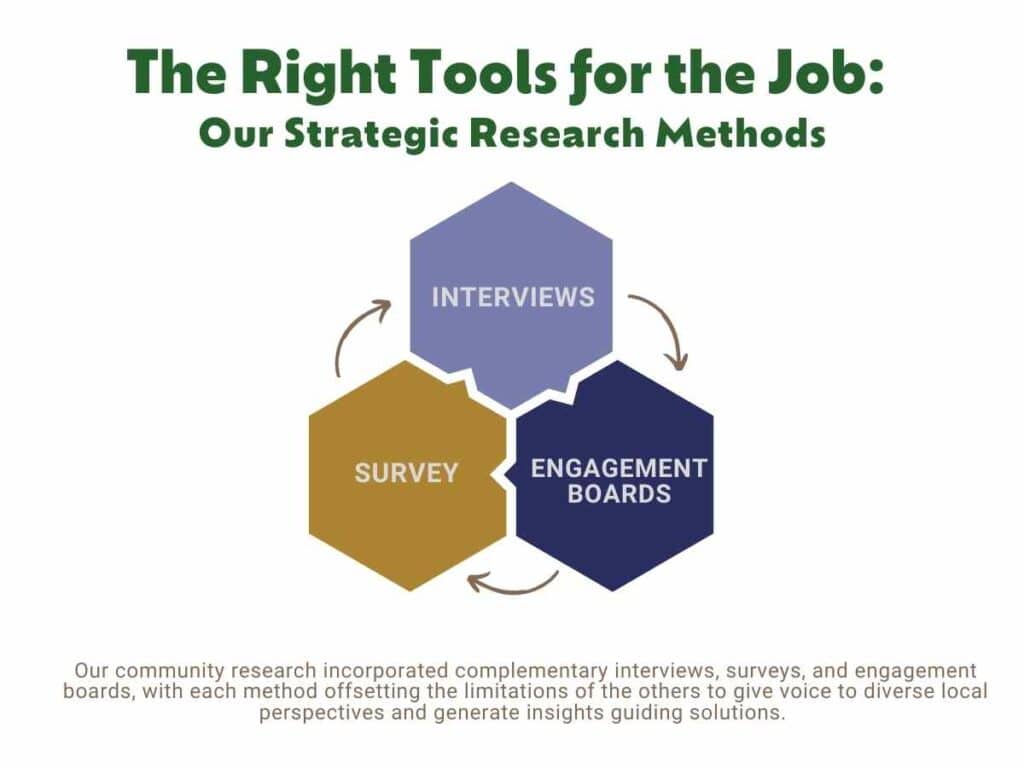Community-based participatory research (CBPR) offers a powerful approach for organizations to equitably engage marginalized groups, center local voices, and drive community-led solutions. Rather than extractive, top-down research on communities, CBPR conducts inquiry with communities as equal partners.
In this post, we’ll explore a recent community-based participatory research case study highlighting Flourish & Thrive Labs work with a Lake County nonprofit seeking to boost Hispanic civic participation. We’ll share how principles like cultural humility, co-design, and mutual capacity building allowed us to gather nuanced community insights while laying the groundwork for sustained collective action. Far more than a data collection method, CBPR represents a philosophy of listening, collaborating, and activating research for social justice. Our case study traces this journey from inquiry to action.
Table of Contents
The Problem: A Vibrant Hispanic Population Excluded from Local Decision-Making
The Hispanic community is a cultural cornerstone of North Chicago, IL, making up over 30% of the city’s population. Currently, 16% of residents are foreign-born, with 70% originating in Latin America. Over half of immigrants arrived before 2000, showing an established community, while 23% came since 2010. According to 2019 voting estimate data by the US Census Bureau, the total Hispanic population of voting age in North Chicago is 7,020. They estimate that 66% of the adult Hispanic population are US Citizens and are eligible to vote. Of all adult (18+) US Citizens in North Chicago the Hispanic population accounts for 21%.

However, while Hispanic residents are engaged members of the North Chicago community, their voices remain marginalized in local leadership and governance. This disconnect manifests itself in numerous ways. Public meetings and events often lack Spanish translation services, leaving Spanish speakers unable to follow or participate. Engagement efforts by the city rarely target the Hispanic population specifically or seek input on issues of importance to them. Described as “box-checking,” the City and School District 187 fulfill legal requirements but do little to engage the community. For instance, the City of North Chicago’s website features a calendar on the front page that inconsistently lists meetings.
This absence of representation is especially concerning given the upcoming transition to an elected school board model in North Chicago. Amidst shifting demographics, the city faced school district challenges. In 2012, after financial issues and declining test scores and financial issues, the Illinois State Board of Education (ISBE) stepped in and installed an Independent Authority to govern the district. Working with a Financial Oversight Panel, the Independent Authority achieved dramatic improvements financially and academically. Their success resulted in ISBE voting in 2022 to transition back to an elected school board by 2027, starting with elections for seats in 2025.
Without major changes to engage Hispanic voters and candidates, the Hispanic community risks continued exclusion in education decision-making under the new electoral system. The prospect of being shut out of discussions that impact everything from curriculum to funding has many anxious that Hispanic needs will continue going unheard.
The History: A Local NGO’s Commitment to Hispanic Engagement
Recognizing the high stakes of Hispanic underrepresentation as North Chicago transitions to an elected school board, a non-profit organization commissioned our team to study the barriers facing the Hispanic community in local leadership. As a pillar of North Chicago’s social fabric for years, the non-profit has a long track record of uplifting Hispanic voices through community organizing efforts. Their initiatives engage residents around voter registration, public education on pressing issues, and training emerging leaders.
By commissioning this case study, the non-profit saw an opportunity to gain actionable insights into how to further inclusion and representation as the school board shifts to direct public elections. Their goal was to ensure the Hispanic community has a seat at the table in the future role of the school board.
Importantly, the non-profit recognizes that genuine, lasting change relies on community-driven solutions developed and led by residents themselves. Top-down interventions by external organizations tend to falter. Thus, this research sought to uncover opportunities and ideas directly from Hispanic residents to empower them to shape local decision-making.
The Approach: Studying Hispanic Perspectives on Civic Participation
To understand barriers and opportunities around Hispanic engagement with North Chicago governance, our team set out to hear directly from Hispanic residents themselves.
Over a six-week period, we conducted approximately 25 in-depth interviews with residents and community leaders in both English and Spanish. Participants included immigrants, first-generation residents, Hispanic business owners, and multi-generational families, representing diverse socioeconomic backgrounds.
A total of 25 semi-structured interviews were conducted with a diverse range of stakeholders, including current and former School Board members, City employees, nonprofit workers, and residents. We recruited participants at heavily attended Hispanic community events and in partnership with local organizations, ultimately garnering 180+ responses. The survey asked about respondents’ participation in civic life.
Finally, the team developed novel community engagement boards placed strategically around North Chicago. These boards posed a simple but insightful question: “Where do you turn for help?” Additionally, we asked residents to place stickies on a map of where they work, play, and engage in various activities.
In developing the survey and conducting outreach, our team drew on original research methodologies honed through our community-based consulting practice. We strive to meet residents where they are and elevate voices often left out of traditional civic processes.
Our multi-modal community engagements revealed several pivotal insights, which were shared in a written report, a presentation to their board of directors, and an executive summary shared with the community in both English and Spanish.
These results gave the non-profit a crucial perspective from within the Hispanic community on how greater civic participation and leadership representation could be achieved.
Additionally, throughout the process, we leveraged capacity building. We had regular sessions where we communicated back with the non-profit about the process so that they could increase their capacity– a key part of our process.

The Solution: Recommendations to Boost Hispanic Representation
Based on insights uncovered through interviews, surveys, and engagement boards, our team formulated strategic recommendations to boost Hispanic leadership and engagement around the 2025 school board elections and beyond.
We compiled these recommendations into a report shared with the organization’s leadership and board of directors—recommendations centered on building Hispanic civic capacity and dismantling systemic barriers to representation.
Equipped with data-driven recommendations and a nuanced understanding of community perceptions, the organization can more effectively empower and mobilize Hispanic residents in the pivotal 2025 elections and beyond.
Additionally, a summary of the report was provided back to those who had participated in the research to ensure that they benefitted from the research.
The Outlook: A North Chicago Where Hispanic Voices Are Heard
While work remains, this assessment provided a roadmap to guide the non-profit, partners, and allies in building Hispanic representation and engagement over the long term. With sustained investment and effort, Hispanics can gain an equal voice in shaping North Chicago’s governance and community prosperity.
Shared leadership and community-driven solutions are cornerstones of just, equitable government. We applaud the non-profit for committing to do this hard work the right way – not through external intervention, but by supporting residents to lead the change.
No obstacle can stand in their way when communities leverage their greatest asset—their people. North Chicago’s Hispanic community possesses immense untapped potential to guide the city forward. But residents must be given the tools and opportunity to access that power.
Let’s Leverage Community-Based Participatory Research for Your Community
At Flourish & Thrive Labs, we are equipped and eager to partner with nonprofit organizations on community-centered research like this case study. Our team brings robust qualitative and quantitative skills and a passion for uplifting marginalized voices. We excel at gathering on-the-ground insights to inform strategic solutions for complex social issues. If your organization seeks to engage your community more fully and authentically, we are ready to help.
Our community-based participatory research approach puts local perspectives first to drive meaningful change. We would love to discuss how we can better collaborate with you to understand your community’s realities and aspirations. By conducting outreach rooted in dignity, we gain actionable wisdom to advance inclusion and equity together. Let’s connect to discuss community-based approaches that empower residents to lead.

